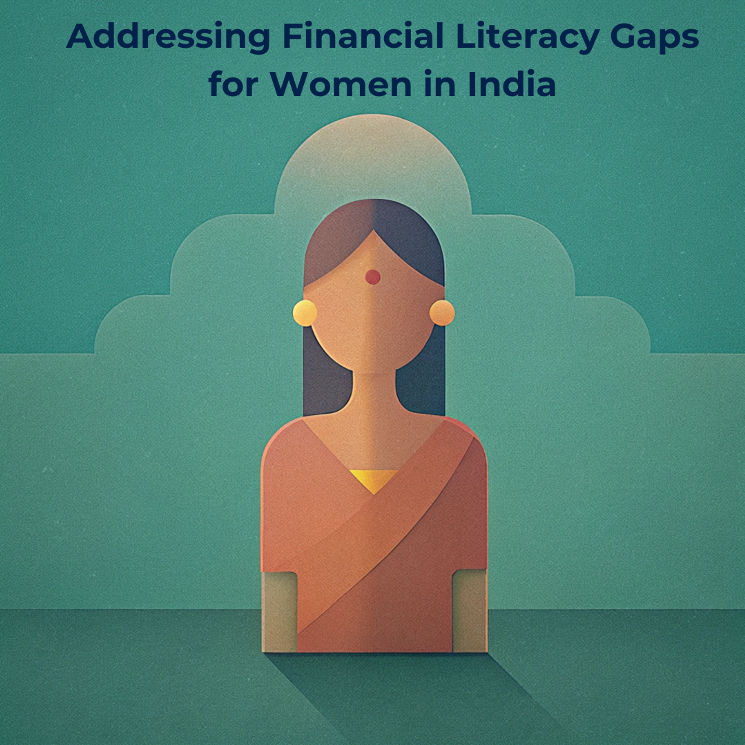Overview:
- Reasons to be educated financially
- Running households does not mean financial freedom is not needed
- Gender pay gap contributes heavily to a low literacy rate
- Gender stereotypes contribute to lower financial literacy
Did you know that 80% of Indian women struggle with financial literacy?
Beyond just inequality, women’s lack of financial knowledge in India hinders their ability to become economically independent and flourish. Imagine countless women held back, not by their own limitations but by a lack of financial literacy, their potential unrealized. This unseen obstacle impedes decision-making, investing, and saving.
According to The Hindu, over 92% of women in India engage in unpaid domestic work. This highlights the importance of financial literacy not only in managing the household effectively but also in making informed decisions.
What makes Financial Literacy so Significant?
Before proceeding, it is necessary to explain the concept of financial literacy. The capacity to understand and use various financial skills, such as budgeting and saving is referred to as financial literacy. Women make up a sizable share of Indian homemakers, so it’s a must for them to have essential financial knowledge. This knowledge is essential for them to run the household and provide for all of the dependents’ financial needs.
According to the Humanity Welfare Council, around 62% of Indian women do not own bank accounts or have limited access to banking services. Considering gender pay gaps, the lower income makes them vulnerable to economic shocks such as long debts and lower opportunities.
As the Washington Post has reported: “This burden of unequal debt is compounded when women enter the workforce and face the gender pay gap. Women often earn less, which means they take longer to pay off student debt. As a result, they might still be paying off student loans in retirement, like the 65-year-old woman profiled.

What Are the Roots of This Problem?
To mitigate such issues it is essential to target the root cause of the problem.
Women are often excluded from financial matters in India. This is because people still believe that it’s men’s duty to handle the finances. As a result, women never get the chance to develop the understanding or knowledge pertaining to these matters.
Men often handle finances in couples, while married, divorced, and widowed women are less likely to develop financial knowledge.

Secondly, the gender pay gap does not make it easier for women to pay their bills or provide them an incentive to work harder.
According to the World Inequality Report 2022 estimates, men earn 82 percent of the labor income in India, whereas women earn 18 percent.
How does this relate to lower financial literacy? It disincentivizes women from putting a step forward and working hard, which leads to lesser rewards than the average pay. This leads to women incurring more burdens and also gaining less experience in financial matters, which affects their financial literacy
Thirdly, a lack of education provided to women.
Even in the 21st century, many people believe it’s not important to educate women. It is considered a financial burden to educate them, further contributing to gender discrimination. This is highly prevalent in rural India where women of India are much more susceptible to violence and threats than men. Many women still face issues such as dowry, domestic violence, flesh trade, and sexual harassment.
As per the Economic Survey 2022-23, 65% of India’s population lives in the rural areas. This means that most of the country finds it taboo to send women to higher education.
Next, a lack of awareness of various schemes that uplift women financially.
The government has introduced many schemes that can help women today. For example, schemes such as Orient Mahila Vikas Yojna, Stree Shakti, Udyogini, and more exist to uplift women financially. However, there is a lack of information and awareness about these schemes in both rural and urban areas.

Steps towards Mitigating the Roots
Every government leader keeps repeating the same questions: how can we be different? What can we do differently? However, nothing really changes at the society or the community level.
The real solution to these problems lies in financial education. By educating and spreading awareness about the same children will be able to efficiently handle complicated issues and control household money. Early budgeting, saving, and investing training equips children with the knowledge and abilities to manage money problems. They could also contribute to household expenses and make wise financial decisions for the rest of their life.
Any help must target not only the women but also the men and family members, as they play a crucial role in advancing one’s rights. Therefore, taking these steps is essential:
1. Joining hands with NGOs. NGOs exist for various reasons, however most of them exist as charities or for empowerment. A 2-step solution can be used. Inform and Help. Thousands of families need guidance toward proper education, while others require information on the negative effects of discrimination. We can identify this and mitigate it as per the family’s structure.
2. Since the world is technologically driven, a mobile app could be created to incentivize financial learning. This can include financial coaches, peer groups and online workshops that engage women with the concept of financial literacy.
3. Finally, volunteering/conducting sessions in middle school to understand the depth of the matter. When young adults volunteer in rural schools, teaching underprivileged children’s financial skills and basics of investing, it inspires them to support their families.
Conclusion:
Complete financial literacy for women is a long-term goal, but progress speeds up through government schemes and NGO collaboration. As the population continues to grow, it is imperative that everyone recognizes the importance of understanding financial principles. By leveraging resources and support, we can accelerate this process, empowering women with the financial knowledge needed for a secure future.


